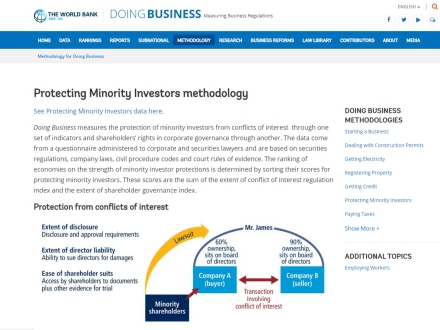The World Bank ranked Serbia 37th, when it comes to minority shareholders’ rights in related-party transactions and in corporate governance, in its Doing Business 2020 report within the Economy Profile of Serbia.
This topic measures the strength of minority shareholder protections against misuse of corporate assets by directors for their personal gain as well as shareholder rights, governance safeguards and corporate transparency requirements that reduce the risk of abuse. The improvement achieved in this area is the highest leap and represents a progress from the 83rd to 37th rank.
In the area of protection of minority interests the indicators measure: disclosure, ability of minority shareholders to sue and hold interested directors liable for prejudicial related-party transactions, available legal remedies, director liability, ease of shareholder suits, shareholders’ rights and role in major corporate decisions, governance safeguards protecting shareholders from undue board control and entrenchment, ownership and control, corporate transparency on ownership stakes, compensation, audits and financial prospects.
In the World Bank’s Doing Business 2019, Serbia is ranked 44th among 190 economies by the ease of doing business, which is a 4-rank increase compared to the previous year.
The project provides objective measures of business regulations and their enforcement across 190 economies and selected cities at the subnational and regional level. The first study, published in 2003, covered 5 indicator sets and 133 economies. This year’s study covers 11 indicator sets and 190 economies. Economies are ranked on their ease of doing business, from 1–190. A high ease of doing business ranking means the regulatory environment is more conducive to the starting and operation of a local firm, it is more business-friendly. Those economies that score well on Doing Business tend to benefit from higher levels of entrepreneurial activity and lower levels of corruption, which provides an additional impetus for the private sector, productivity, investments and economic growth.
This topic measures the strength of minority shareholder protections against misuse of corporate assets by directors for their personal gain as well as shareholder rights, governance safeguards and corporate transparency requirements that reduce the risk of abuse. The improvement achieved in this area is the highest leap and represents a progress from the 83rd to 37th rank.
In the area of protection of minority interests the indicators measure: disclosure, ability of minority shareholders to sue and hold interested directors liable for prejudicial related-party transactions, available legal remedies, director liability, ease of shareholder suits, shareholders’ rights and role in major corporate decisions, governance safeguards protecting shareholders from undue board control and entrenchment, ownership and control, corporate transparency on ownership stakes, compensation, audits and financial prospects.
In the World Bank’s Doing Business 2019, Serbia is ranked 44th among 190 economies by the ease of doing business, which is a 4-rank increase compared to the previous year.
The project provides objective measures of business regulations and their enforcement across 190 economies and selected cities at the subnational and regional level. The first study, published in 2003, covered 5 indicator sets and 133 economies. This year’s study covers 11 indicator sets and 190 economies. Economies are ranked on their ease of doing business, from 1–190. A high ease of doing business ranking means the regulatory environment is more conducive to the starting and operation of a local firm, it is more business-friendly. Those economies that score well on Doing Business tend to benefit from higher levels of entrepreneurial activity and lower levels of corruption, which provides an additional impetus for the private sector, productivity, investments and economic growth.

